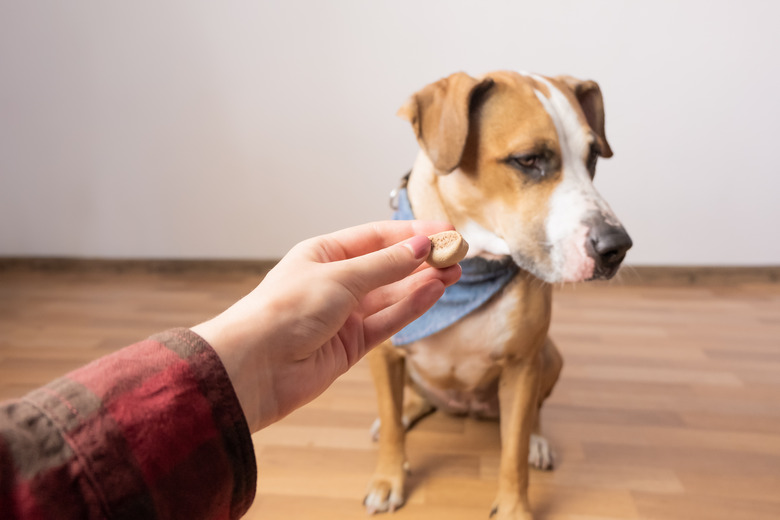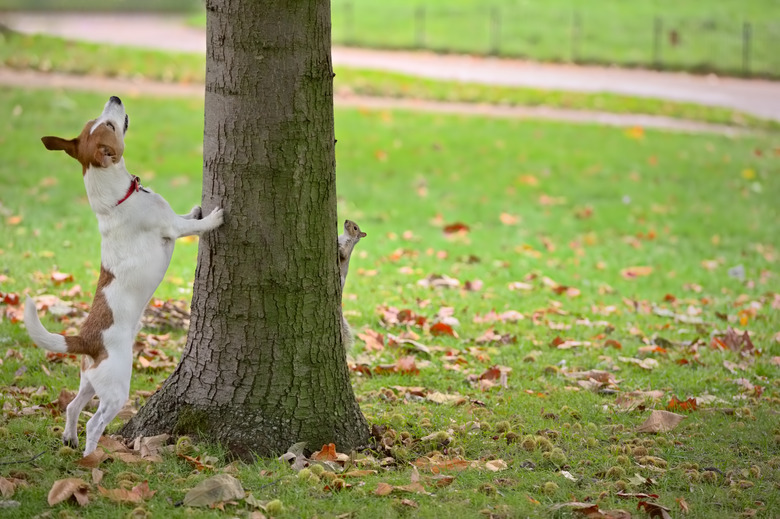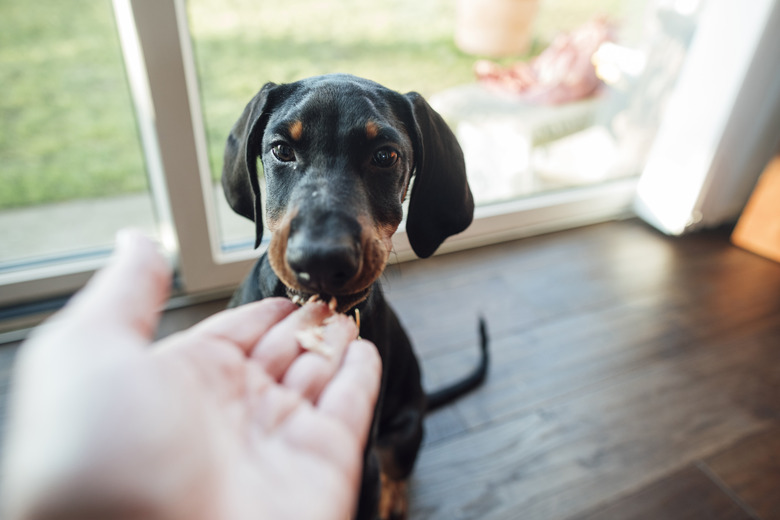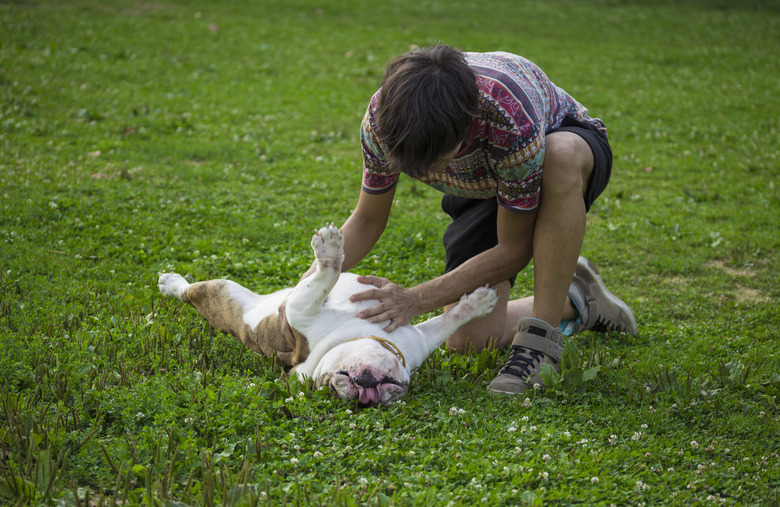How Do I Train A Dog Who Isn't Food Motivated?
We may receive a commission on purchases made from links.
Cuteness may earn compensation through affiliate links in this article.
If you've ever tried training a dog, you've probably heard of the positive reinforcement technique. This method uses a reward system to help a dog associate certain behaviors with something — usually, a tasty treat. But what happens if you're working with a dog who isn't especially motivated by food?
Luckily, dogs value a variety of things, and training is definitely possible once you've identified whatever it is that your dog is willing to work for.
Remove any distractions
Remove any distractions
Before you start training your dog, you'll want to remove anything that may distract him from his lesson. This will help your dog focus on you and the task at hand, and will set him up to succeed — which will ultimately make learning fun and more successful! If it's toys or another pet inside the home that's got his eyes wandering, try moving him to a quiet area outdoors. Alternatively, if squirrels and passing cars tend to get him going, take your lesson indoors if possible.
Sometimes, distractions can come in the form of pent-up energy. While some trainers may recommend exercising your dog until he is exhausted before you start training him, be wary of over-exhausting him, which may result in a stressed-out dog who won't be able to focus on the task at hand. If your dog seems more interested in running laps than in his training lesson, they suggest warming up alternating exercising, like a few ball tosses, and practicing some commands your dog already knows and does well before you try teaching him anything new.
Reduce stress and rule out stomachaches
Reduce stress and rule out stomachaches
Another thing to keep in mind is that maybe your dog isn't distracted, but fearful. A dog who is experiencing fear, stress, or anxiety is likely not going to be interested in taking treats. Helping your dog feel safer and getting to the root cause of whatever they are feeling anxious about will be necessary for any kind of training to take place, whether or not it involves treat-taking.
In addition, a dog who is feeling physically unwell or who has frequent bouts of GI upset might also appear uninterested in food treats. It's worth a trip to the vet to make sure there aren't any underlying medical issues, allergies, or other problems that are contributing to the lack of interest in food.
Try high-value treats first
Try high-value treats first
If your dog seems unmotivated by food, it could be that she just isn't motivated by the food she's being offered. Try opting for soft, chewy treats instead of hard ones. You want them to be small enough that they are valuable, and your dog wants more of them.
Cloud Star Tricky Trainers Chewy Soft Low-Calorie Dog Training Treats serve up rich chicken liver flavor with only 3 calories per treat, so you don't have to worry about your dog packing on pounds during learning sessions. If your dog prefers sweet tastes to meaty tastes, check out Bocce's Bakery Low Calorie, Wheat Free Training Bites Dog Treats in Mud Pie, Oh My flavor. Carob, peanut butter, and vanilla flavors will tempt your dog's taste buds with a special high-value flavor.
If prepackaged treats intended for training just aren't working for your dog, you can also look to other high-value snacks you know your dog won't be able to say no to, like small pieces of chicken breast meat, pieces of banana or dehydrated fish.
Scheduling your dog's training
Scheduling your dog's training
While your dog may not be motivated by a treat at the moment, all dogs are, to some degree, motivated by food, simply as a means for survival. In the case of some dogs, not working for food may be attributed to the simple fact that they just aren't hungry. If your dog is a food grazer and has access to kibble 24/7, you may want to consider putting them on a feeding schedule. This change will help you to understand when your dog is hungry, which presents a prime opportunity to get some lesson work in.
Whether your dog is motivated by cooked chicken breast, string cheese, or turkey hot dogs, trainer Olivia Healy, CPDT-KA, FFCP, recommends cutting treats into pea-sized bits and keeping training sessions short, at just around 5 minutes. It's worth trying to find some morsel that your dog loves to give them an extra reason to learn their lessons for the day — sometimes, refusing to learn a particular lesson is non-negotiable, especially if you're working on recall commands or other lessons needed to ensure your dog's safety.
Praise and pets
Praise and pets
Some dogs who aren't particularly motivated by food may not place treats high up on their "things I value" scale. In this case, you'll want to consider what high-value items do make your dog's list. Sometimes, the simple act of receiving praise or physical touch is more than enough of a reward for a dog. As I Heart Dogs originally reported, sometimes, the most positive reward of all to a dog can be an approving touch or verbal reassurance from the person they aim to please the most. If your dog seeks affection regularly and isn't responding to the food you're offering her, you can try rewarding her with her favorite form of love once she's done what you ask of her, be that a rub on the belly, or an enthusiastic "good girl!" and a pat on the head.
Reward with play
Reward with play
Finally, playtime is an often overlooked yet highly effective training method for many dogs, especially if yours has a seemingly endless amount of energy. If your dog seems focused on you yet anxious to get to the good part of spending time together (read: playtime,) you can try rewarding her with a fun dog toy or game in lieu of a snack — just be sure to do so as soon as she holds up her end of the bargain, just as you would a training treat, to help her associate the two. For examples, you can ask your dog for a "sit" and then throw the tennis ball, or ask for a "come" and then whip out a rope toy for a game of tug.
The most rewarding toys stimulate your dog's prey drive, allowing them to chase, chew, and wrestle a dog-safe object. ASOCEA Dog Extendable Teaser Wand rewards your dog with chasing a tethered "tail." The non-slip, durable handle gives you a firm grasp on the wand and nylon tail stands up to even heavy biters.



